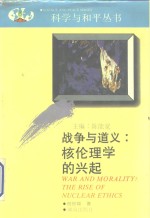

战争与道义 核伦理学的兴起PDF电子书下载
- 电子书积分:10 积分如何计算积分?
- 作 者:倪世雄著
- 出 版 社:长沙:湖南出版社
- 出版年份:1992
- ISBN:7543802864
- 页数:233 页
绪论:核时代与核伦理的兴起 1
前言页 1
CHAPTER ONE Introduction: The Nuclear Age and Nuclear Ethics 1
1.1核时代的伦理学 3
1.1.1伦理学的主要特点 3
Main Features of Ethics 3
1.Ethics in The Nuclear Age 3
1.1.2核伦理学的基本要素 5
Basic Factors of Nuclear Ethics 5
2.New Contents of Nuclear Strategy 7
The Formation of Nuclear Deterrence Strategy 7
1.2核战略的新内容 7
1.2.1核威慑战略的提出 7
Four Phases of U.S. Nuclear Strategy 8
1.2.2美国核战略的四个阶段 8
3.New Remedies of Nuclear Peace 13
Three Choices Facing Manking 13
1.3核和平的新药方 13
1.3.1人类面临的三种选择 13
1.3.2一种新和平战略 14
A New Peace Strategy 14
CHAPTER TWO Main Contents of Nuclear Ethics 18
1.Two Waves to Explore The Transformation of Mankind s Thinking Modes 18
2 核伦理学的基本内容 18
2.1探索改变人类思维方式的两次“浪头” 18
2.2“动机—手段—结果”的模式分析 20
2.2.1两种不同的观点 20
Two Different views 20
2.“Motive—Means—Result model Analysis 20
2.2.2“动机—手段—结果”的主要模式 21
Major Motive—Means—Result Models 21
Three Stresses 23
2.2.3三个强调点 23
2.3.1核心内容 24
The Core Subject 24
3.Moral Choices in The Nuclear Age: Five Basic Principles 24
2.3.2五条基本原则 25
2.3核时代的道义选择:五条基本原则 25
Five Basic Principles 25
3 核伦理学的主要流派和理论 39
3.1西方国际关系理论的演变轨迹 39
1.Evolutionary Traits of Western International Relationship Theories 39
CHAPTER THREE Main Schools of Thought and Theories of Nuclear Ethics 39
3.1.1理想主义与现实主义 40
Idealism VS. Realism 40
Scientific Behaviourism VS. Traditionalism 42
3.1.2科学行为主义与传统主义 42
3.1.3新现实主义 47
Neo—realism 47
2.“Morality Debate and Main Schoos of Thought 48
The Up—Down—UP Cycle 48
3.2.1“起—伏—起”周期 48
3.2“道德之辩”与主要流派 48
“Morality Debate 49
3.2.2“道德之辩” 49
Four Main Schoolsof Thought 50
3.2.3四个主要流派 50
3.3.1国际政治伦理学 58
3.Main Theories of Nuclear Ethics 58
Ethics of International Politics 58
3.3核伦理学的主要理论主张 58
Superpower Ethics 65
3.3.2超级大国伦理学 65
Futurology of International Relations 70
3.3.3国际关系未来学 70
4.1.1国际机制的定义 79
4 核伦理学与国际机制 79
CHAPTER FOUR Ethics and International Regime 79
1.Definition and Evolution of International Regime 79
Definition of International Regime 79
4.1国际机制的定义与沿革 79
4.1.3国际机制的沿革 82
4.1.2几点区别 82
Several Differences 82
Evolution of International Regime 82
Salient Characteristics 84
4.2国际机制的基本特征 84
4.2.1两种研究方法 84
2.Salient Characteristics of International Regime 84
Two Study Methods 84
4.2.2基本特征 84
Three Main Schools of Thought 94
4.3.1三个主要流派 94
4.3国际机制的主要流派和理论取向 94
3.Main Schools of Thought and Theoretical Orientations of International Regime 94
4.3.2若干理论取向 99
Certain Theoretical Orientations 99
4.4关于国际机制的几点评论 104
4.4.1热门话题 104
4.Some Comments on International Regime 104
A Hot Topic 104
4.4.2三个强调及其实质 105
Three Stresses and The Essence 105
5.1.1军备控制理论的提出 107
CHAPTER FIVE Nuclear Ethics and Arms Control 107
1.The Shaping of Arms Control Theory and Its Implication 107
The Formulation of Arms Control Theory 107
5 核伦理学与军备控制 107
5.1军备控制理论的产生及其含义 107
The Nuclear History in Retrospect 108
5.1.2核历史的回顾 108
5.2军备控制的主要内容和措施 115
5.2.1核裁军 115
Nuclear Disarmament 115
2.Basic Contents and Measures of Arms Control 115
The Prevention of Nuclear Proliferation 123
5.2.2防止核扩散 123
5.2.3建立“信任——安全”措施 133
The Taking of Confidence—Security Measures 133
5.3效果的判断和机制的建立 137
5.3.1如何判断军备控制的效果 137
3.The Judgment of Effect and The Establishment of Regime 137
How to Judge The Effect of Arms Control 137
The Establishment of Nuclear Security Regime 138
5.3.2建立核安全机制 138
5.3.3其他因素 141
Other Factors 141
The Origin of Human Rights Thinking 143
6.1.1人权思想的渊源 143
6 核伦理学与国际人权 143
6.1国际人权的渊源、内容和发展 143
1.The Origin, Content and Development of International Human Rights 143
CHAPTER SIX Nuclear Ethics and International Human Rights 143
Three Big Events 145
6.1.2三个重要事件 145
Two Important Watersheds 147
6.1.3两个重要分水岭 147
The Generation Concept 151
6.1.4“代”的概念 151
International Human Rights Regime and Its Features 156
2.The Analysis of International Human Rights Regime 156
6.2.1国际人权机制及其特点 156
6.2国际人权机制分析 156
Analytical Models of International Human Rights Regime 157
6.2.2国际人权机制的具体模式 157
6.2.3国际人权机制的类别 160
Categories of International Human Rights Regime 160
6.2.4国际人权机制演变的特征 166
Characteristics of the Evolution of International 166
The Cycle of U.S. Human Rights Diplomacy 169
3.The Cycle of U.S. Human Rights Diplomacy and Its Essence 169
6.3.1美国人权外交的周期 169
6.3美国人权外交的周期及其实质 169
The Essence of U.S. Human Rights Diplomacy 173
6.3.2美国人权外交的实质 173
1.The Starting of World Order Theory 180
what is World Order? 180
CHAPTER SEVEN Nuclear Ethics and World Order 180
7.1.1什么是世界秩序 180
7.1世界秩序的理论启动 180
6 核伦理学与世界秩序 180
7.1.2理论启动的三件事 182
Three Events in Starting World Order Theory 182
7.2.1一个先决条件 188
7.2世界秩序从“模式”到“政策” 188
One Prerequisite 188
2.World Order: From Model to Policy 188
Main Points of U.S. World Order policy 190
7.2.2美国世界秩序政策的要点 190
3.The Analysis of U.S. New World Order Strategy 195
7.3美国“世界新秩序战略”剖析 195
Strategical Perceptions of U.S. New World Order 196
7.3.1美国世界新秩序的战略认识 196
Basic Framework of U.S. New World Order Strategy 199
7.3.2美国世界新秩序的基本构想 199
A Summary 203
7.3.3小结 203
CHAPTER EIGHT Conclusion 204
1.Some Comments on Western Nuclear Ethics 204
The Essence of Bourgeois Ethics 204
8.1.1资产阶级伦理学的实质 204
8.1关于西方核伦理学的几点评价 204
8 结论 204
The Limitations of Western Nuclear Ethics 206
8.1.2西方核伦理学的局限性 206
Criticism and Borrowing 208
8.1.3批判与借鉴 208
2.Chinese Perspective 210
Chinese Basic Position on The Issue of Nuclear Weapons 210
8.2.1中国在核武器问题上的基本立场 210
8.2中国的观点 210
Chinese Clear—cut Attitude Towards International Human Rights 214
8.2.2中国在国际人权问题上的鲜明态度 214
Chinese Fundamental views on New World Order 216
8.2.3中国在国际新秩序问题上的主要观点 216
BIBLIOGRAPHY 219
主要参考书目 219
INDEX 224
索引 224
POSTSCRIPT 232
后记 232
- 《亚历山大继业者战争 上 将领与战役》(英)鲍勃·本尼特,(英)麦克·罗伯茨著;张晓媛译 2019
- 《中学物理奥赛辅导:热学 光学 近代物理学》崔宏滨 2012
- 《医学物理学》洪洋 2020
- 《教师教育系列教材 心理学原理与应用 第2版 视频版》郑红,倪嘉波,刘亨荣编;陈冬梅责编 2020
- 《美国的伤痕 独立战争与美国政治的暴力基因》(德)霍尔格·霍克(Holger Hoock)著 2019
- 《幼儿园教师专业伦理》步社民等 2019
- 《高等医药院校教材 医学物理学实验指导》(中国)杨晓岚 2019
- 《写给孩子的趣味物理学》(俄)雅科夫·伊西达洛维奇·别莱利曼著 2019
- 《医用物理学 第3版》陈月明 2019
- 《新闻心理学概论 第6版》刘京林 2019
- 《中风偏瘫 脑萎缩 痴呆 最新治疗原则与方法》孙作东著 2004
- 《水面舰艇编队作战运筹分析》谭安胜著 2009
- 《王蒙文集 新版 35 评点《红楼梦》 上》王蒙著 2020
- 《TED说话的力量 世界优秀演讲者的口才秘诀》(坦桑)阿卡什·P.卡里亚著 2019
- 《燕堂夜话》蒋忠和著 2019
- 《经久》静水边著 2019
- 《魔法销售台词》(美)埃尔默·惠勒著 2019
- 《微表情密码》(波)卡西亚·韦佐夫斯基,(波)帕特里克·韦佐夫斯基著 2019
- 《看书琐记与作文秘诀》鲁迅著 2019
- 《酒国》莫言著 2019
- 《中国十大出版家》王震,贺越明著 1991
- 《近代民营出版机构的英语函授教育 以“商务、中华、开明”函授学校为个案 1915年-1946年版》丁伟 2017
- 《国之重器出版工程 云化虚拟现实技术与应用》熊华平 2019
- 《新闻出版博物馆 总第33期》新闻出版博物馆 2018
- 《湖南考古辑刊》湖南省文物考古研究所 2019
- 《哈佛出版史》董唯责编;李广良,张琛译者;(美)马克斯·豪尔 2019
- 《近代中国分省人文地理影像采集与研究 湖南》《近代中国分省人文地理影像采集与研究》编写组 2019
- 《新时代期刊编辑出版的理论与实践》吴厚庆 2019
- 《上海市订购苏联情报出版物联合目录与索引 1983》上海科学技术情报研究所 1983
- 《中国骨干旅游高职院校教材编写出版项目 中国饮食文化》邵万宽 2016
